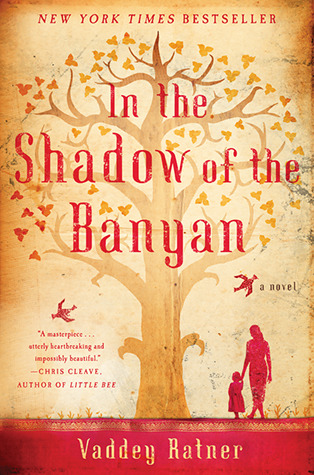Synopsis
Over the next four years, as she endures the deaths of family members, starvation, and brutal forced labor, Raami clings to the only remaining vestige of childhood—the mythical legends and poems told to her by her father. In a climate of systematic violence where memory is sickness and justification for execution, Raami fights for her improbable survival.
Displaying the author’s extraordinary gift for language, In the Shadow of the Banyan is testament to the transcendent power of narrative and a brilliantly wrought tale of human resilience.
Review
I read this while the electricity was out this afternoon. I've heard glowing reviews about this one, and it was nominated best fiction in the Goodreads Choice Awards 2012 long list, but I've seen glimpses of the book a while ago before that and bought it immediately.
I love the orange cover, although the one in my possession had a boring cover of a (banyan) tree with branches, red leaves and a green background.
The story is a semi-autobiographical account of the author's own experiences as a child. I am not sure which parts of the story are true and which are fictional, but that's the best part about fiction, it's the author's little secret.
As a Cambodian, Raami and her family members were forced out of their homes by Khmer Rouge soldiers, members of the revolutionary seeking chaos. By mistake and naivette, her mistake caused her father to be taken away from them, and their identity threatened their safety. One by one her family members perished and were separated, until it was just Raami and her grief-stricken mother doing the best to provide for them and protect themselves.
It is through Raami's eyes that we see everything. Through her young perspective that we interpret things, through her eavesdroppings that we listen to hushed conversations, through her feelings that we share her pain and sorrows. I am actually glad that I get glimpses of people around Raami through her narration - it makes everything much more childlike and innocent, therefore a little easier to bear (although some parts are really gruesome and hard to go through, nevertheless).
I love the characters, they are so vivid and alive. I love her parents best - the lovely Aana (Mama) and the calm, serene Papa. I love their chemistry, their family dynamics, their exchanged words - those said and even unsaid. I love Raami's penchant for fairy tales, as I am also a big fan of stories and myths. I love how the fairy tales implicate what's in Raami's life, woven into them and how Mama explains why she never told Raami any stories when she was a child (because she wanted to provide a reality for her, instead of lovely stories to believe in).
It is sad, and it is bittersweet. I have tears on my eyes when I read some difficult chapters, and in the end it is Raami's spirits that take her to where she is, and what she decides to become.
When I read it, I can't help but be reminded of Between Shades of Grey, which I loved. They cannot be compared - the stories, the friendships, the battles are different, but the essence is similar. It is about the courage and hope one finds when everything else is stripped bare. It is about finding strength even when all is lost.
A truly inspirational story with beautiful prose and Cambodian mythological theme that blends nicely into the story.


Tidak ada komentar:
Posting Komentar